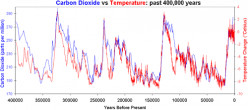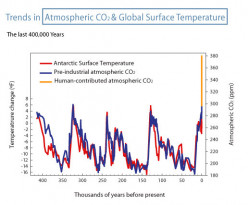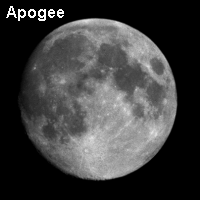The journal Nature debunks climate change theory.
Here's the story:
http://www.nature.com/nclimate/journal/ … e1589.html
It's lengthy. Have fun. I am sure it won't be reported in the MAin Stream Media.The computer models don't give the day today or monthly fluxuations but we have had a very quiet 100 years which is unusual. Probably helped in spurring industry, travel, etc. The weather is going to be the more normally-erratic.
We are supposed to be going into a 'mini ice age' just like in the Dark Ages so maybe global warming is a good thing.
It's like clock work but the USDA has updated the chart from this:
To this new chart:
It has to do with the Earth's precession:
Here's another chart of the same info:
Nothing is new under the sun, the Sumarians & the Mayans both knew of this cycle - Here is a link to a video that I made that shows how today, Polaris is almost 1/2 degree circle. Check it out!
http://www.youtube.com/watch?v=qab-zntCQ7Q
The Mayan calender is based on the Earth's wobble - it's not some voodoo omen - just the facts that the Earth has been very hot before - like palm trees in the poles hot. Good for Canada - sucks to be Mexico.The paper you link to doesn't say what you claim it says, JSChams. Climate scientists have been working with tree ring data to gain an understanding of orbital forcing for some time. There's other data from the same time frame that show a different picture. From working climate scientists,
Please note that the article referred to in the OP is one of many in the Nature Climate Change journal, which is published by the Nature Publishing Group. Critical thinkers would be advised to read the many back issues and articles about global warming before attempting a fact-filled debunking of the science behind climate change.
Back to work for me. Have a great day Hubbers!Things I learned from your link to a website with an agenda:
- If you eliminate any study or data that does not support your thesis, you will only have data remaining that supports your thesis. (I fail sophomores for doing this.)
I am concerned by that general cooling trend over the past millenium. Maybe the answer is that we need to spew out as much CO2 as possible!
Oh....yeah CO2...
http://hotair.com/archives/2012/07/03/b … 91-levels/CO^2! CO^2!

They are already trying to do a fake volcano in the air to combat the rising heat. Sounds like an extremely bad idea. So I wrote about it.
I can't post link to own hub - but I get to nuke the Big Island of Hawai'i in the process and put the final genocidal nail on the kanaka maoli.
The "journal Nature" doesn't have any position. It is a neutral forum to share data.
Less CO^2 probably because of the lousy economy. Notice the traffic is less (less people working) & such a fat sudden drop has to be due to short term factors. Are cows less flatulent? Doubtful but maybe there are less cows because people eating less beef from again - the lousy economy.
Nature is the most prestigious scientific journal (family of journals now) in the UK.
Many scientists see it as a huge achievement to get a paper accepted for publication in Nature.But you can't say the position of an author publishing in Nature is a position "of" Nature. They maintain editorial independence. My point being that the title of this thread is misleading.
No, but a paper that is published in Nature will have been rigorously peer-reviewed for scientific quality. So Nature is at least vouching for its authors in that respect.
Indeed. So it might be worth seeing how many pro- or anti- papers they have published in the last year. Rather than just assuming the last one is definitive.
I haven't read may last few issues. To be honest Nature is heavily angled towards micro scale stuff so it began to lose my interest. This will be a nice change.
I'm being micro managed by lots of folks right now. It will pass.
The earth's climate has always been changing since the earth was cretaed. The earthe went through many smaller ice ages and pole shifts since recorded history. It would not supprise me if the earth is getting warmer as the earth's rotation and orbit slows down.
Hey I got a question, I know that the tides make the moon go a little faster and that's why such a large moon is so close yet hasn't crashed already. Yet they say the moon is receding - should the moon be like farther away than it is?
The Apollo astronauts placed a reflector oh the moons surface and astronomers used this as a reference point and with a laser and concluded that the moon is moving about 2” away every year. But as you pointed out, the moon, sun, and the earth’s rotation is responsible for the rise and fall of the tides and in return, gives the moon a boost in orbital speed causing it to pull further away from earth’s orbit. In other words orbital speed is slightly overcoming the earth’s gravitational pull.
2 inches/year? I hear so many different numbers on that.
(Google,google,google .......)
When the moon is closest to the Earth, it's also travelling "sideways" at its fastest rate. ... true for any elliptical orbit ...perigee and apogee distances are calculated based on the distance between the centres of the Earth and Moon... The moon does not actually revolve around the Earth; it revolves around the Sun in concert with the Earth (like a double planet system).

OK here's what I'm looking for - from http://nineplanets.org/luna.html
"the force between the Earth and the Moon is not exactly along the line between their centers producing a torque on the Earth and an accelerating force on the Moon. This causes a net transfer of rotational energy from the Earth to the Moon, slowing down the Earth's rotation by about 1.5 milliseconds/century and raising the Moon into a higher orbit by about 3.8 centimeters per year"
"620 million years ago, Earth's day was only 21.9±0.4 hours ... 650 million years ago, the lunar rate of retreat was 1.95±0.29 cm/year... 2.16 cm/year in the period between now and 650 million years ago"
OK, I'm done - more coffee!
Oh.
1) This article was not in Nature, but Nature Climate Change, a brand new journal that doesn't even have an impact factor yet and when it gets one, don't expect it to be good.
2) Nature Climate Change journal papers generally seems to accept that the global climate is changing, including manmade changes
3) The paper suggests that the climate has spontaneously cooled *in Europe* by a very small amount over the last 2000 years due to changes in the position of the earth. (No conclusion is implied about world wide climate, just Europe)
3) Cooling of one zone due to astronomical position of 2000 years is independent of warming of the whole planet due to industry over the last 50 years.
4) The author explicitly acknowledges both effects occur in the quote: "This figure we calculated [o.3 degrees Celsius] may not seem particularly significant,' Professor Esper said. 'However, it is also not negligible when compared to global warming, which up to now has been less than 1 degree Celsius."
--To translate: the scientist is saying, I found that Europe got 0.6 degrees colder over the last 2000 years. That doesn't sound like a lot but then you realize that global warming, which is clearly really important, has also had less than a degree of effect to date.
So, the original poster either didn't read the paper or didn't understand it. It is not debunking global warming at all, and in fact doesn't even relate to it except by analogy. The researcher is saying his finding is a big deal because it is in some way comparable to global warming (which he thinks is clearly a big deal).NOAA reported last week that last summer was the hottest on record since records have been kept (1880's) and the last six months were the warmest 6 on record.
Don't tell that to the satellites, they show that we haven't even approached the temperatures of 1998.
The satellites also show a disruption to the seasons.
"Our weather has turned dangerous because our climate is breaking down. 40,000 heat records have already been broken this year across the United States, according to the National Oceanic and Atmospheric Administration."
The moon makes the tides. The tides do not move the moon.
it is natural for the earth to experience periods of global warming and cooling. Look at the dust bowl in the 1920/30's, the mini-ice age in Europe several hundred years ago.. ultimately we can't say if there are any truly disruptive trends until enough time has passed to look back at the present time and data in the context of a millenia
As the author of the research stated, the existence of natural warming and cooling does not relate to the existence of manmade climate change. They both exist simultaneously.
Related Discussions
- 129
49% of American believe climate change is a hoax or "aren't sure"
by Sychophantastic 11 years ago
These are results of a public policy poll:Q1 Do you believe global warming is a hoax, ornot?Do ................................................................... 37%Do not ............................................................. 51%Not sure...
- 32
is this new info. on climate change...?
by SparklingJewel 9 years ago
from the patriotpost:::a new study out of England, where scientists are relying not on computer-generated models of the Earth, but the real thing.Wolfgang Knorr of the University of Bristol's Department of Earth Sciences has found that in the past 160 years the Earth's absorption of carbon dioxide...
- 52
Mars Also Undergoing Climate Change as Ice Age Retreats, Study Shows
by Kenna McHugh 6 years ago
The Sun actually has something to do with the Climate Changehttps://m.washingtontimes.com/news/2016 … ge-retrea/
- 46
The Global Warming Scam has failed. Time for Global Cooling . .
by sannyasinman 15 years ago
Global Cooling and the New World Order ... http://blogs.telegraph.co.uk/news/james … rld-order/
- 9
Should it be called climate change or global warming?
by Cyn Lee 9 years ago
Should it be called climate change or global warming?
- 207
Can the Earth Survive Four Years of a Trump Presidency?
by Scott Belford 8 years ago
There are two major would shaping forces at risk with a Trump presidency; an economic meltdown brought on by a sharp decline in American productivity, and, a much more important one, the environment. I will leave the economy to another forum, for it is the environment I am much more worried...

















